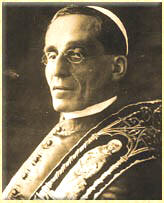 With battle smoke hanging heavy over Flanders fields and Carpathian
Mountains, the Cardinals realized that the next pope should be a diplomat. The
man chosen was Giacomo della Chiesa, who took the name Benedict XV.
With battle smoke hanging heavy over Flanders fields and Carpathian
Mountains, the Cardinals realized that the next pope should be a diplomat. The
man chosen was Giacomo della Chiesa, who took the name Benedict XV.
Giacomo della Chiesa was born at Genoa on November 21, 1854. He studied law
at Genoa and theology at Rome's Gregorian University. Ordained in 1873, he
became a doctor of sacred theology in 1879. Giacomo entered the papal diplomatic
service and soon caught the eye of the great diplomat Rampolla. When Rampolla
became secretary of state, Giacomo joined him as a valuable assistant. In 1901
he was made under-secretary of state. Pius X continued him in this office until
1907, when he made Giacomo archbishop of Bologna. Here Della Chiesa proved to be
a capable and excellent spiritual leader. Pius X made him a cardinal in 1914.
Benedict XV faced a difficult task. As father of all Catholics he had to
maintain strict neutrality. He succeeded so well that while excitable Allies
called him pro-German, excitable Germans called him pro-Ally. Benedict
constantly pleaded for peace, but not until 1917 did he judge the time ripe for
a formal attempt to mediate between the Powers. Certain German elements welcomed
the papal overtures, but after a good deal of excited buzzing and rumor
mongering, it became sadly evident that not even the hideous blood bath of three
years had brought either side to be really earnest in a desire for a fair and
square peace. The Pope did his best to lessen the miseries of the frightful
conflict. Thanks to Benedict, disabled prisoners were exchanged through neutral
countries, and later, after weary efforts, Benedict succeeded in getting wounded
and sick prisoners sent to recuperate in the comparatively well-off neutral
countries. The Pope also tried to help suffering civilians. His intercession
enabled deported Belgians to return home. He begged mercy for the poor
Armenians, and he donated money freely to the suffering all over war-torn
Europe.
After the armistice Benedict continued his good work. He pleaded with the
Allies to stop the murderous blockade of Germany which was causing so much
suffering to women and children. At the Pope's command a collection was taken up
in Catholic churches throughout the world to help hungry children.
Benedict urged Wilson to use his great influence for a just peace, but the
Pope expressed disappointment at the results of the Paris Peace Conference.
Although excluded from the League of Nations, the Pope praised the idea behind
it, and at a time of excited nationalist hate, he pleaded for recognition of
human solidarity.
In 1917 Benedict promulgated the great new Code of Canon Law but he gave the
credit to his illustrious predecessor, Saint Pius X.
Influenza carried off this man of peace on January 22, 1922. Among his last
words were "We offer our life to God on behalf of the peace of the
World." Rightly has Benedict XV been called "The good Samaritan of
humanity.
Excerpted from "Popes
Through the Ages" by Joseph Brusher, S.J.

